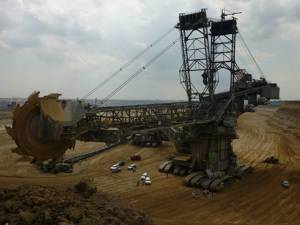The international fight against dirty energy will reach a crescendo this weekend, as thousands of people join together in an unprecedented stand against coal expansion.
Hidden away in the rural Lausitz region, stretching across the German-Polish border, a huge environmental disaster is unfolding.
On the German side of the border, Swedish energy company Vattenfall plans to further expand existing mining operations in the region, while in Poland, state-owned PGE wants to extract almost two million tonnes of brown coal, or lignite.
But this weekend, residents of the region’s threatened villages and thousands of concerned citizens will come together and link hands in a final stand against dirty coal, forming an 8-kilometer long human chain connecting two villages at the heart of this struggle for survival.
Kerwitz in Germany and Gabice in Poland both face being razed to the ground to make way for two huge new lignite mines. 700-year-old villages will be decimated, beautiful landscapes destroyed and livelihoods and cultures ruined, as some 6000 peoples’ homes are bulldozed to make way for dirty industry, leaving a desolate landscape in its place.
An historic part of Germany – and home to the Sorbs ethnic minority group – the Lausitz protest is not only fighting for the future of the region but also for the distinct and historic cultures that call it home.
As thousands join hands in Lausitz, thousands more across the world will join in solidarity, calling on leaders to break free from the shackles of dirty industry and invest in a cleaner and fairer energy future and shining an international spotlight on German Chancellor Angela Merkel. Once hailed the “climate chancellor”, she risks losing her crown as she sits back and watches this climate catastrophe unfold.
One of the world’s dirtiest fuels, the reckless expansion of lignite is devastating for the climate. Burning brown coal would use up half of the CO2 budget of Poland and Germany from 2020 to 2050, and in the Lausitz region alone Vattenfall’s three existing coal plants are responsible for the same level of emissions as the whole of Sweden.
The numbers are clear; lignite must stay in the ground.
Yet in July, NGOs released a new report – Europe’s Dirty 30 – showing 9 out of the 30 dirtiest power plants in Europe are located in Germany and are predominantly burning lignite.
Failing to tackle rising coal emissions will not only undermine Germany’s climate commitments, but the whole of Europe’s, calling into question its role on the international stage.
Exactly a month before the leaders meet in New York for the UN Secretary General’s Climate Summit, this weekend’s protest represents part of a burgeoning anti-coal movement. Next month, thousands more will take to the streets around the world as part of the People’s Climate Mobilisation, and urge governments to support climate ‘Action Not Words’.
Merkel, along with leaders from across the EU and the world now have a choice to make: follow their citizens’ lead or end up on the wrong side of history.

